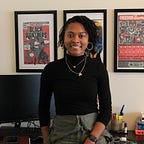The South Got Something to Say
Kiese Makeba Laymon is one of the greatest southern writers I have come across. A marker of a great southern artist is the ability to capture the south in all its essence. They remind people “We Black Southerners, through life, love, and labor are the generators and architects of American music, narrative, language…” Kiese Laymon, a writer from Mississippi, reminds us that the south has something to say. I was introduced to Laymon through his memoir Heavy, but I became more enthralled with his work with How to Slowly Kill Yourself and Others in America.
I tried to avoid Laymon’s memoir, Heavy, as long as I could. It was released in 2018 and I got the courage to finally read it in 2020. My apprehension about reading the book was because of how everyone described it. The conversation usually went like, “Hey Ashlyn you need to read this book Heavy. It is… heavy.” I now understand the loss of words on how to describe Kiese’s memoir. He explores topics that are complex and some that are rarely discussed in Black families from abuse and trauma to Black abundance. Kiese weaves them into a narrative that is relatable and requires the readers to also confront themselves.
My next read by Kiese was, How to Slowly Kill Yourself and Others in America. It lived up to every expectation. Laymon dives deeper into whiteness, men being vulnerable, and our connection to the places and people we love. My favorite essay is “Da Art of Storytellin’ (A Prequal)”. I could feel each word with every southern bone in my body. Laymon describes his grandmother waking up everyday to get ready to go to work at the chicken plant: taking a bath, powdering herself, and then putting on her ironed clothes. “She understood that the audience of her work was not just her white male shift managers, but all the Southern Black women workers who had preceded her and, most, important, all the Southern Black women workers coming next.” Before my grandma would make us take Father Johns, she used to say, “I don’t care if you are a street sweeper. You be the best street sweeper you can be.” I think she knew the same thing as Kiese’s grandmother, we owe it to the people before us and after us to show up fully.
Reading work by Kiese Laymon gives me the same feeling he had when listening to Outkast’s ATLiens. “ATLiens was unafraid of the revelatory dimensions of Black Southern life.” As I read and develop my own writing, what I take from Kiese is that our literary voices are not fully formed. I am also shedding the voice that Black students develop out of academic necessity. It requires us to lose our southern idioms and choose a voice “that sat with its legs crossed, reading the New York Times.”
Kiese talks about that stank, and I know it all too well. As Laymon put it, “This stank was root and residue of Black Southern poverty, and devalued Black Southern labor, Black Southern excellence, Black Southern imagination, and Black Southern woman magic. This was the stank from whence Black Southern life, love, and, labor came.” Kiese places that stank in his work. He is, as he proclaims, “a Southern Black worker, committed to building stank- ass art rooted in honesty, will, and imagination.” I am excited to see what stories he lends his voice to next.
Kiese Laymon’s book Long Division being rereleased in June 2021.
My Favorite Kiese Interviews:
